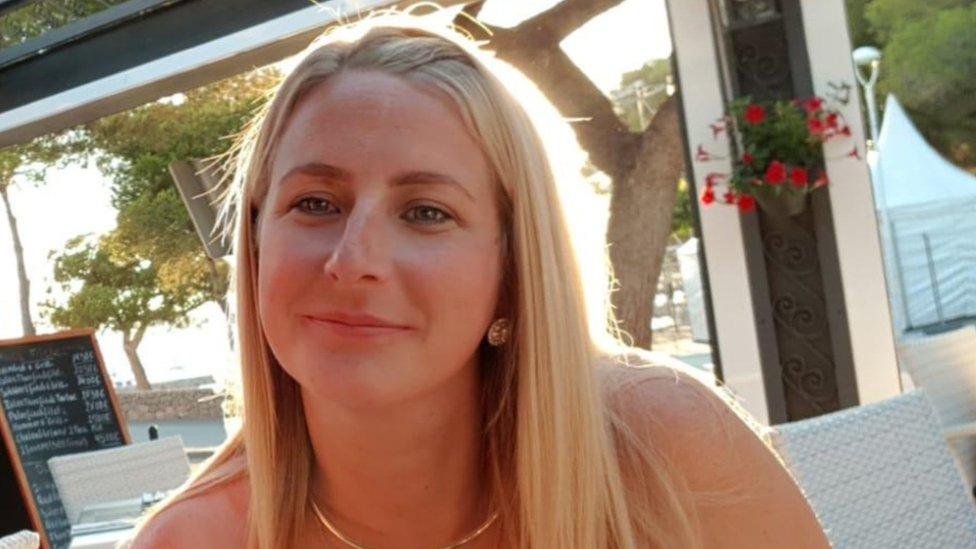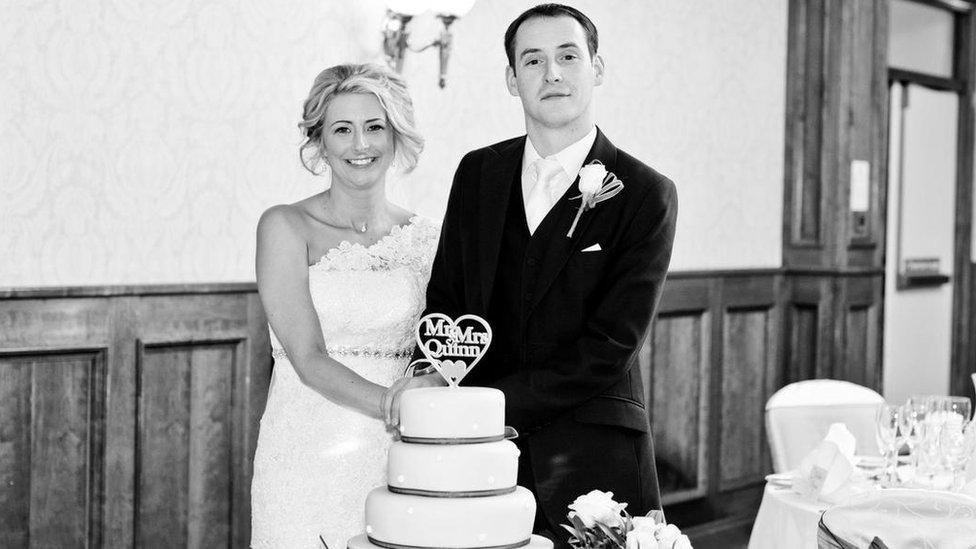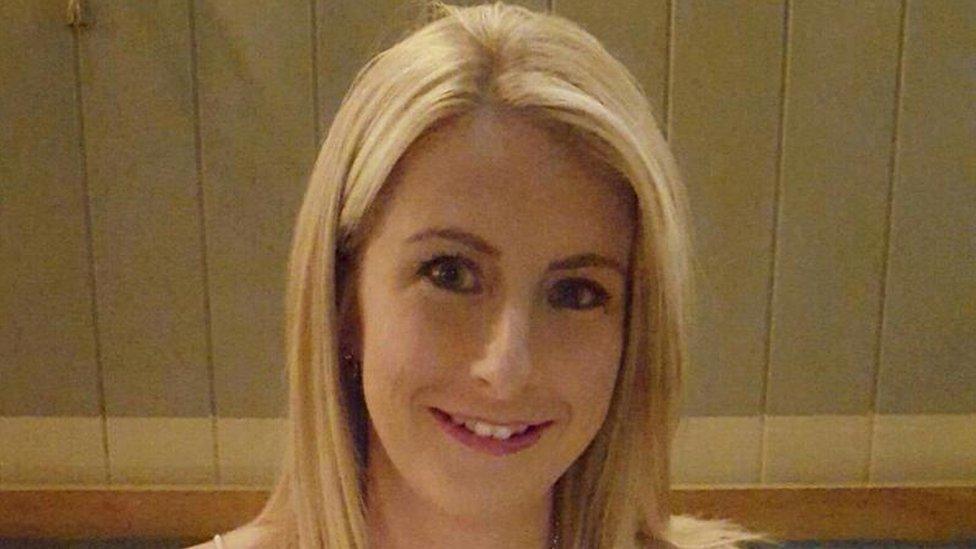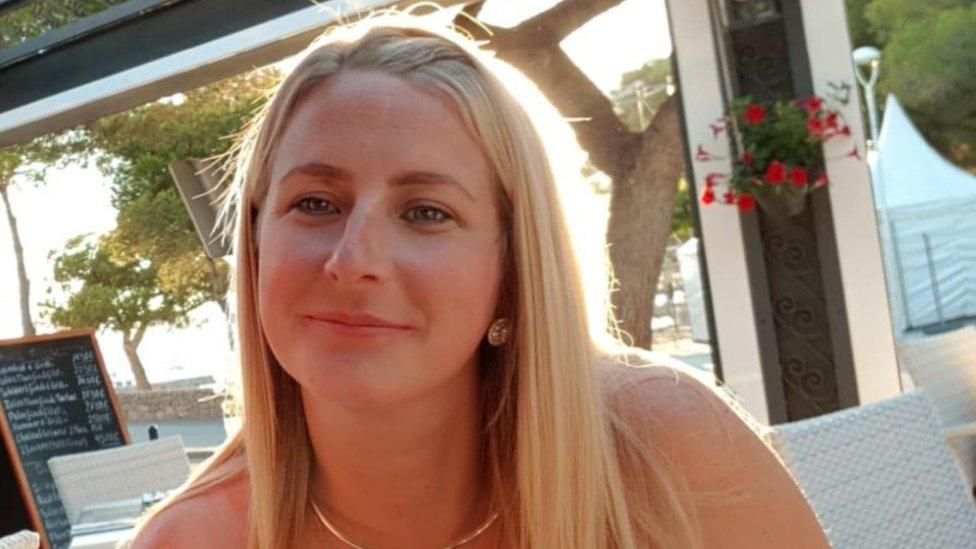Orlaith Quinn: Death 'more likely' avoided if suitable care provided
- Published

Orlaith Quinn, 33, died in the early hours of 11 October 2018
The death of a woman who took her own life in hospital would have "more likely" been avoided had appropriate care been in place, an inquest has heard.
Orlaith Quinn died in October 2018 at Belfast's Royal Jubilee Maternity hospital.
A consultant psychiatrist agreed it was "more likely than not" Mrs Quinn would have survived had a suitable level of care been provided.
Dr Neta Chada gave evidence on Friday.
She spoke along with Prof Eleni Palazidou, a retired consultant psychiatrist with more than 30 years experience.
The expert witnesses previously reviewed the case and produced a joint statement, which was read to the court.
Both experts agreed that the mental health assessment carried out by the Psychiatric Liaison Team was not of "adequate standard", and that the appropriate diagnosis was one of postpartum psychosis.
The inquest previously heard evidence from consultant psychiatrist Dr Robert Boggs, who assessed Mrs Quinn, 33, hours before her death.
He told the inquest that he did not observe evidence of psychosis, or any suicidal ideations during his assessment and that his working diagnosis was obsessional neurosis.
Dr Boggs also made the "differential diagnosis" of postpartum psychosis and, referring to his entry in the patient notes, said it could not be ruled out one day postpartum.

Mrs Quinn's husband Ciaran, in previous evidence to the inquest, said he believed she would "still be alive today if she received the appropriate care"
In her evidence, Dr Chada said postpartum psychosis "can at times be difficult to identify".
The inquest heard that both she and Prof Palazidou "agreed that puerperal psychosis (postpartum psychosis) should have been considered as a priority diagnosis, even if the liaison doctor assessment failed to identify this as such".
The experts added that Dr Boggs had considered this "a possibility given the risk associated with the condition".
They said this was important as it would inform the management plan, which would have considered the "worst possible scenario".
The two psychiatrists agreed the possibility of postpartum psychosis was not clearly communicated to either the patient or her family.
The court also heard both experts agreed that continuous one-to-one supervision of Mrs Quinn was required, by a mental health professional, until her assessment by a consultant psychiatrist the following day.
They also agreed that communication of Mrs Quinn's care management plan was "not reasonable" and that her husband, who stayed the night to take turns caring for their baby, did not realise the risks involved when she would be on her own for several hours.
The expert witnesses also found that nursing staff were given "vague advice of watchful waiting" and were not given any indication as to what "signs and changes" they should be looking out for.
They said both family and nursing staff should have been informed of the possible diagnosis of postpartum psychosis even if the Psychiatric Liaison Team did not consider it the main diagnosis.

Mrs Quinn had given birth less than 48 hours before her death
A lawyer representing the family of the deceased referred to remarks made by Mrs Quinn's husband, Ciaran Quinn, in his previous evidence to the inquest.
Mr Quinn, he said, previously told the court it was his strong belief that his wife was "totally failed by the hospital through the date of the 10th October 2018 and leading into 11th October 2018".
He added that he believed his wife would "still be alive today if she received the appropriate care that she was crying out for, and what her condition demanded" and that for this reason he was "struggling each day to accept her death".
The inquest also heard evidence from Dr Peter Sloan, a consultant psychiatrist from the Belfast Health Trust, who was involved in making recommendations following a Serious Adverse Incident review of Mrs Quinn's death.
The court heard about steps which the Trust had taken to ensure that all mental health staff providing psychiatric liaison and out of hours input into maternity services "should have specific training and induction throughout their professional development in understanding the specific features of and risks associated with perinatal health and mental illness".
The coroner thanked all those who had given evidence and said she proposed to deliver her findings on the 26 May.
- Published10 May 2022
